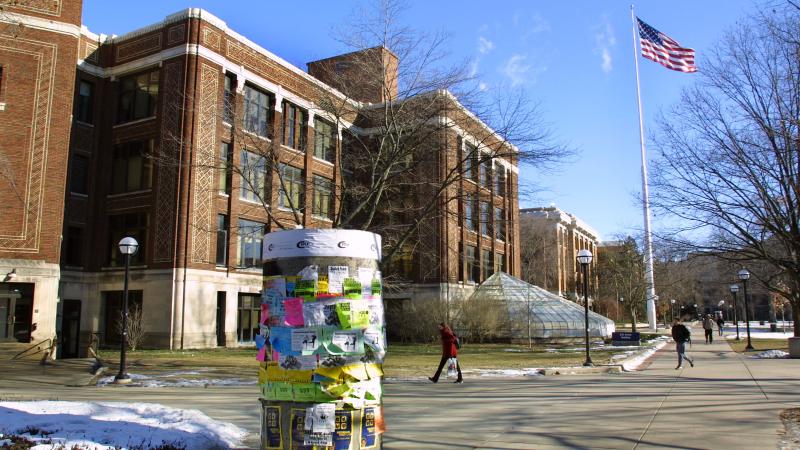'Zombie Chevron': Feds have unchecked power under appeals ruling on abortion funding, groups warn
"If scores of federal agencies can attach thousands of strings to billions of federal dollars" apart from the "clear statement" judicial doctrine, "that is a very big deal," Republican attorneys general tell full 6th Circuit, seeking rehearing.
A federal appeals court botched new Supreme Court precedent so badly in a lawsuit on federal strings for family-planning funding that it threatens to "puzzle judges and the public for years to come, while inspiring further executive overreach" on completely unrelated issues, according to a legal filing by a former Senate Judiciary Committee counsel for Utah Republican Mike Lee.
Marc Marie's Center for Environmental Accountability made a surprise appearance among friend-of-the-court briefs asking the full 6th U.S. Circuit Court of Appeals to rehear Tennessee's lawsuit against the Biden administration for cutting off its funds under Title X, which bars direct abortion funding, over its refusal to meet new abortion conditions that violate state law.
The Department of Health and Human Services' 2021 rule was par for the course with Uncle Sam's support for abortion even in the prior Republican administration. Last year, the Government Accountability Office, the investigative arm of Congress, found federally funded programs routed at least $1.89 billion to major abortion providers from 2019 to 2021.
The 1984 Chevron ruling upheld the Environmental Protection Agency's authority to define a "source" of pollution under the Clean Air Act. By rescinding Chevron deference in June, SCOTUS told lower courts to stop upholding "permissible" agency interpretations of their ambiguous statutes and instead evaluate whether it's the "single, best meaning."
"Given the dozens of Supreme Court decisions and countless circuit-level decisions that reached" the permissibility question, Chevron will remain undead in Kentucky, Michigan, Ohio and Tennessee – giving the feds the continued "authority to flip-flop into new binding interpretations" – unless the full 6th Circuit reverses the three-judge panel, CEA said.
Marie's nonprofit files regulatory comments and briefs relevant to "lawfulness, efficacy, and tradeoffs of regulatory policy in the energy and environment space." He was also senior counsel in the Justice Department's environmental division and acting deputy solicitor at Interior.
Two joint briefs were predictable: a group of 22 GOP-led states and the American Association of Pro-Life Obstetricians and Gynecologists, Catholic Medical Association, Christian Medical and Dental Association and National Association of Catholic Nurses. The Ethics and Public Policy Center (EPPC) filed its own brief calling for rehearing.
The 6th Circuit panel upheld a lower court ruling refusing to block the 2021 HHS regulation, which requires state recipients to offer pregnant women "neutral factual information and nondirective counseling" on pregnancy options including abortion.
"Congress unambiguously authorized HHS to regulate Title X eligibility" and the Volunteer State "knowingly and voluntarily accepted" the "unambiguous" terms of the grant, Judge Stephanie Dawkins Davis, nominated by President Biden, wrote for the divided panel in August.
Both President George W. Bush nominees agreed with Davis that Tennessee was unlikely to prevail on its Administrative Procedure Act (APA) claim that mandatory nondirective counseling violates Title X. But Judge Raymond Kethledge said his colleagues misread the barely two-month-old Loper Bright ruling that eliminated Chevron deference.
While Davis and Judge Julia Smith Gibbons said Loper Bright "forecloses new challenges based on specific agency actions that were already resolved" under Chevron deference, Kethledge said the panel has "no occasion to defer" to the specific agency action reversed by HHS in 2021: the agency's 1988 interpretation of Title X's Section 1008.
Back then, SCOTUS deferred to President Reagan's HHS in reading Section 1008's ban on funds for abortion "as a method of family planning" as extending to counseling or referral for abortion, but HHS spent the following decades seesawing on whether "Title X programs may or even must provide abortion counseling and referrals," Kethledge wrote.
"Just as adoption or IVF are methods of family planning for programs that refer patients to providers for those services … so too is abortion a method of family planning for programs that refer patients to abortion providers," putting the 2021 rule at odds with Section 1008, he said.
CEA's brief echoed Kethledge's reasoning, calling it "mystifying" that the panel "whistles past the grave" of Chevron by binding trial courts to "circuit-level precedent based upon" it rather than one ruling upholding a single agency action, the 1988 interpretation of Section 1008.
"The consequences would be especially felt in environmental law," in which "deference would apply to dozens of provisions in environmental statutes that have been construed as ambiguous in numerous circuit-level decisions over forty years," CEA said. It would let EPA flip-flop on the central dispute in Chevron: plant-wide or "individual smokestack permits."
The Republican attorneys general's brief led by Ohio's Dave Yost opens with a pun. The 6th Circuit panel "lopped off" Loper Bright's limitation to upholding a "specific … [sic] action" under the old framework and instead gave HHS power to adopt a reading of Title X "opposite" to what SCOTUS upheld in 1991's Rust, they said.
By undermining "stability and reliance" in judicial precedents, "the panel guarantees HHS’s power to continue the policy ping-pong that has marked Title X for 40 years" and give "all federal agencies the kind of power that Loper Bright meant to rein in," the brief says.
This is all the more likely because "our gridlocked Congress does not update statutes easily," giving federal agencies incentive to "regulate in the fog" wherever an appeals court has applied Chevron to a statute, they said.
The Republican AGs also said the panel botched the Constitution's spending clause, and the 6th Circuit's own two-year-old precedent on COVID-19 relief funding conditions outside the American Rescue Plan Act, by finding agencies can add funding conditions to statutes.
"If scores of federal agencies can attach thousands of strings to billions of federal dollars" apart from the "clear statement" judicial doctrine, without reliance on a "zombie Chevron ... that is a very big deal," they said.
The pro-life medical groups, represented by Alliance Defending Freedom, said their members stand to lose "generally available public benefits that make it possible for them to serve their patients" without a full-court rehearing.
"HHS engaged in zero statutory analysis" in response to opposing public comments and simply said prohibiting abortion referrals was "inconsistent" with its practice, they argued. The 2021 rule "violates Title X’s plain meaning" and the APA, "and no amount of deference is warranted."
Tennessee's elimination of mandatory abortion referral and counseling "complements and reinforces Title X’s text" and protects medical conscience, which HHS failed to consider before stripping funds, the groups said, showing the rule is "arbitrary and capricious."
Citing Kethledge's partial dissent, the brief says, "statutory stare decisis [adherence to prior rulings] says nothing about whether the opposite agency action – reflected in the 2021 Rule –is lawful." The full 6th Circuit should settle Section 1008's meaning, the brief says, citing future Justice Amy Coney Barrett's 2005 law review article on stare decisis in appeals courts.
After the panel ruled in August, EPPC blasted its indifference to Tennessee's two requests for supplemental briefing on Loper Bright followed by the majority's "extensive discussion" of the precedent "that is likely to confuse district courts" and must be resolved by the full court.
"The Biden-Harris administration’s post-Dobbs pro-abortion agenda demonstrates why this case is critical," they said. The day after SCOTUS returned abortion regulation to the states, President Biden opened the regulatory floodgates to circumvent the ruling and Secretary Xavier Becerra told HHS "to do any and everything" to protect unrestricted abortion.
That's when HHS and other agencies started "conveniently discovering never-before-found authority to advance the administration’s pro-abortion political agenda and override state pro-life laws," the brief says.
The Facts Inside Our Reporter's Notebook
Documents
Videos
Links
- Center for Environmental Accountability
- federally funded programs routed at least $1.89 billion
- The 6th Circuit panel upheld a lower court ruling
- barely two-month-old Loper Bright ruling
- Title X's Section 1008
- precedent on COVID-19 relief funding conditions
- pro-life medical groups, represented by Alliance Defending Freedom
- Amy Coney Barrett's 2005 law review article
- EPPC blasted its indifference














